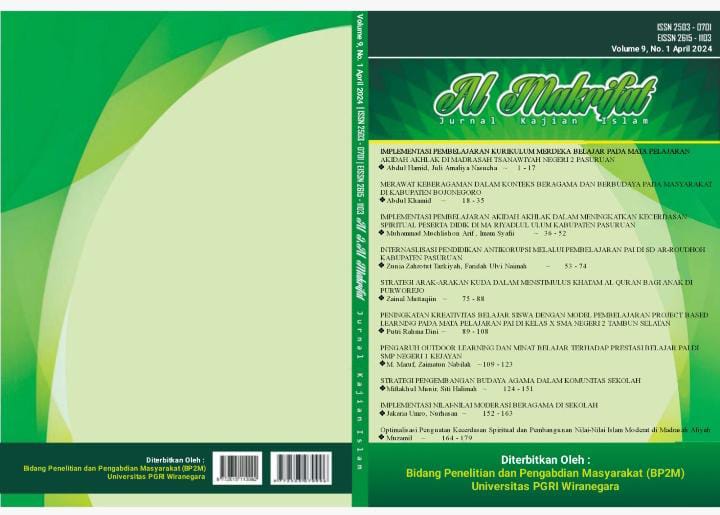Strategi Pengembangan Budaya Agama Dalam Komunitas Sekolah
Abstract
Various research results regarding the problems of PAI in schools so far have found that one of the factors is that the implementation of religious education tends to be worked on more from the teaching or didactic-methodical side. PAI teachers are often only invited to discuss matters of the teaching and learning process, so they are immersed in purely technical-mechanical issues. Meanwhile, more basic issues, namely those related to pedagogical aspects, are not touched upon much. In fact, the main function of religious education in schools is to provide a foundation that is able to raise awareness and encourage students to carry out actions that support the formation of a strong religious personality. These various problems arise, of course, inseparable from policies related to the implementation of Religious Education (Islamic Religious Education in Public Schools), both in the form of external policies originating from the government and internal policies as a form of operationalizing Islamic Religious Education in Public Schools. Various existing policies will not be implemented well if they are not packaged in an effective and efficient learning system. This task must be carried out by all levels of society, especially those implementing education who are in direct contact with the education system. It seems that the above phenomenon has begun to be realized by education implementers in public schools. The limited time allocation for PAI subjects must be enriched with various strategies both in policy and in the learning process. The existence of PAI is not only seen as an independent subject, but more than that its existence is related to other subjects. Thus, the portion for PAI subjects can be more adequate with this policy. Keywords: Strategy, Development of Religious Culture, School CommunityReferences
Malik Fadjar, Visi Pendidikan Islam, (Jakarta Pusat: Lembaga Pengembangan Pendidikan dan Penyusunan Naskah Indonesia (LP3NI), 1998).
Muhaimin, Rekontruksi Pendidikan Islam (Dari Paradigm Pengembangan, Manajemen Kelembagaan, Kurikulum Hingga Strategi Pembelajaran), (Jakarta: PT Raja Grafindo Persada, 2009).
_________, Pengembangan Kurikulum Pendidikan Agama Islam Di Sekolah, Madrasah Dan Perguruan Tinggi, ( Jakarta: PT Raja Grafindo Persada, 2005).
_________, Paradigma Pendidikan Islam( upaya mengefektifkan pendidikan agama islam di sekolah) Bandung: PT Remaja Rosdakarya 2001.
Talizuhu Ndara, 2005. Teori Budaya Organisa .(Jakarta: Rineke Cipta)
Ahmad Tafsir, Metodologi Pengajaran Agama Islam, ( Bandung: Remaja; Rosda Karya, 2004).
Koentjaranindrat, ”Kebudayaan, Mentalitas dan Pembangunan” dalam Muhaimin, Nuansa Baru Pendidikan Islam, (Jakarta: Raja Grafindo Persada, 2006).
Hickman dan Silva (dalam Purwanto, Budaya Perusahaan, (Yogyakarta Pustaka Pelajar: 1984).
Talizhidu Dhara, Budaya Organisasi, (Jakarta: Rinika Cipta, 1997).
HR. Ahmad, 8938. CD Hadith Kutub al Tis’ah.
Harun Nasution, Islam Rasional (Gagasan Dan Pemikiran), (Bandung: Mizan, 1995).
Zainuddin Ali, Pendidikan Agama Islam, (Jakarta: PT Bumi Aksara, 2007).
Abdul Rachman Shaleh, Pendidikan Agama Dan Pembangunan Watak Bangsa, (Jakarta: PT Raja Grafindo Persada, 2005).
Azyumardi Azra, Paradigm Baru Pendidikan Nasional; Rekontruksi Dan Demokratisasi, (Jakarta: PT Kompas Media Nusantara, 2002).
Dedi Supriadi, Membangun Bangsa Melalui Pendidikan, ( Bandung: PT Remaja Rosdakarya, 2005).
Wardiman Djojonegoro, Implementasi Nilai-Nilai Agama Dalam Memantapkan Sistem Pendidikan Nasional. Orasi Ilmiah di IKIP Bandung, Oktober 1995.
Harun Nasution,Pemabahruan Dalam Islam, Sejarah Pemikiran dan Gerakan, Jakarta: Bulan Bintang,1990.
M.Amin Abdullah, Falsafah kalam di Era Postmodernisme, Yogjakarta: Pustaka Pelajar, 1995.
Syamsul Arifin,dkk, Spiritualisasi Islam Dan Peradaban MasaDepan,Yogjakarta: Sipress,1996.
Mahdi Ghulsyani, Filsafat Sains Menurut al-Qur’an, Bandung: Mizan, 1998.




